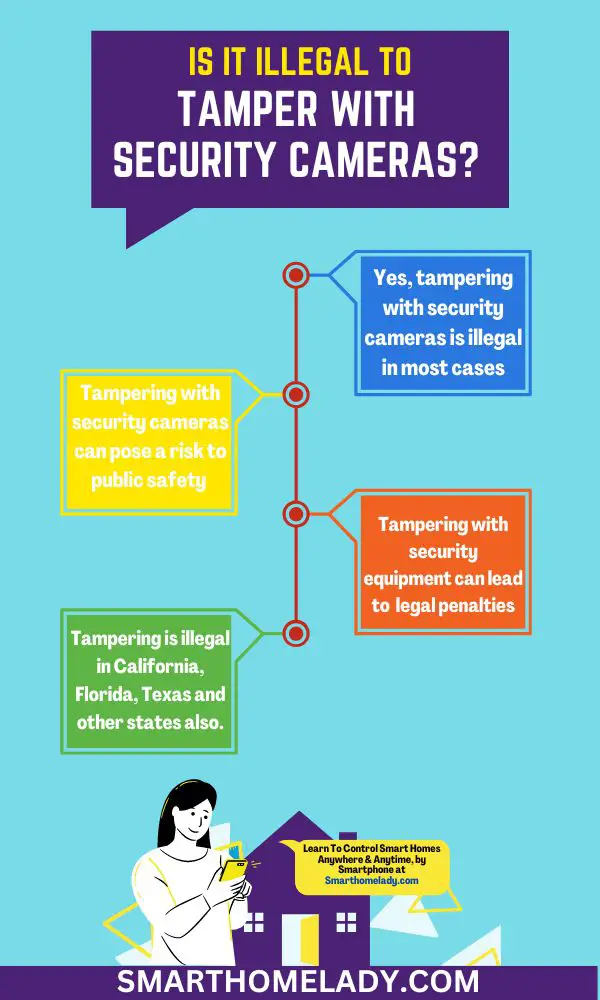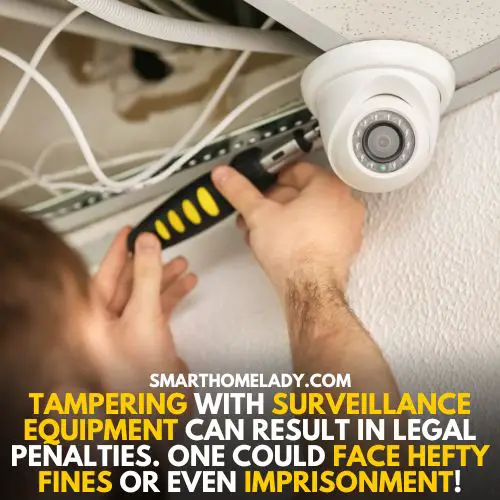As an experienced security camera user, I’m often asked, “Is it illegal to tamper with security cameras?
The short answer is yes; tampering with security cameras can have serious legal consequences.
Security cameras are essential in maintaining the safety and security of homes, businesses, and public spaces.
Tampering with these devices can compromise their effectiveness and put people at risk.
In this article, I’ll discuss tampering with security cameras and the consequences of tampering with surveillance equipment. I’ll also focus on the illegality of tampering in different states to clear your ambiguity.

Contents
- 1 Is It Illegal To Tamper With Security Cameras? Answer is Yes
- 2 The Consequences Of Tampering With Surveillance Equipment
- 3 Is It Illegal To Tamper With Security Cameras in California?
- 4 Is It Illegal To Tamper With Security Cameras in Florida?
- 5 Protecting Your Security System From Tampering
- 6 Can Security Cameras Be Tampered With?
- 7 What is tampering in CCTV?
- 8 Is it illegal to jam a security camera?
- 9 Is It Illegal To Tamper With Security Cameras In Michigan?
- 10 Is It Illegal To Tamper With Security Cameras in Texas?
- 11 Is It Illegal To Tamper With Security Cameras in New York?
- 12 Conclusion
Is It Illegal To Tamper With Security Cameras? Answer is Yes
Yes, tampering with security cameras is illegal in most cases. Destroying, disabling, or obstructing them can result in serious legal consequences, including fines and imprisonment.
Thus, it is crucial to ensure that your security system remains intact and functional at all times so you can enjoy its full benefits without experiencing any setbacks.
Furthermore, tampering with security cameras can pose a risk to public safety and compromise the security system’s effectiveness.
It can also lead to a privacy breach for individuals whom the cameras may monitor. It is important to respect the law and the rights of others when it comes to security cameras.
Other Legal & Privacy Related Articles
- Can Neighbors Have Security Cameras Towards Your House?
- Can You Put A Security Camera On A Telephone Pole?
- Are Home Security Cameras An Invasion Of Privacy?
- Do You Need A License To Install Security Camera?
The Consequences Of Tampering With Surveillance Equipment
As a security camera user, I have seen my fair share of tampering incidents. It’s not uncommon for individuals to try and disable or manipulate cameras for various reasons such as theft, vandalism, or even privacy concerns.
However, it is important to understand the consequences that come with such actions.
Firstly, tampering with surveillance equipment can result in legal penalties. Depending on the severity of the offense, one could face hefty fines or even imprisonment.
In addition to criminal charges, civil lawsuits may be filed against those responsible for any damages caused due to tampering.

Suggested Readings
- Can Security Cameras Be Jammed?
- Can Security Cameras See Smoke?
- How Far Can Security Cameras See At Night?
- Why Do My Security Cameras Go Black?
Furthermore, ethical considerations should also be considered when it comes to using surveillance equipment. Tampering not only undermines its purpose but also violates others’ privacy rights.
Security professionals strive to maintain public safety while respecting individual freedoms; thus, any unauthorized interference goes against their code of ethics.
Is It Illegal To Tamper With Security Cameras in California?
Yes, it is illegal to tamper with security cameras in California. Tampering with security cameras is considered a criminal offense and can result in serious legal consequences.
The state of California has strict laws in place to protect the privacy and safety of individuals, and tampering with security cameras violates those laws.
In addition to the legal consequences, tampering with security cameras can have serious social and ethical implications. It can lead to mistrust and suspicion among individuals and undermine the effectiveness of security systems.
Is It Illegal To Tamper With Security Cameras in Florida?
Yes, it is illegal to tamper with security cameras in Florida.
According to Florida law, anyone who intentionally damages destroys, or tampers with a security camera without the owner’s consent can face criminal charges. This includes acts such as covering the camera, cutting wires, or disabling the system.
Tampering with security cameras is considered a serious offense in Florida because it can compromise the safety and security of individuals and property.
Security cameras are essential for preventing and investigating crimes, and any interference can hinder law enforcement efforts.
Suggested Readings
- Can Security Cameras See Inside Cars?
- Why Do Security Cameras Have Green Lights?
- Can I Use Xfinity Security Camera Without Service?
- CCTV Camera Showing Black Screen
Protecting Your Security System From Tampering
There are several ways to prevent tampering and ensure the safety and reliability of your security system.
First and foremost, it’s essential to identify the common vulnerabilities that may make your cameras more susceptible to tampering. These include exposed wires, weak mounting brackets, outdated firmware, and easily accessible power sources.
To mitigate these risks, consider implementing the following measures:
- Conceal wiring and use secure mounting equipment.
- Regularly update the firmware to maintain optimal performance.
- Install cameras in hard-to-reach areas where intruders cannot easily access them.
By taking these steps, you can significantly reduce the likelihood of camera tampering and enhance the overall effectiveness of your security system.
Remember that prevention is always better than cure when it comes to safeguarding your property against potential threats.
As a security camera expert, I highly recommend being proactive in protecting your surveillance equipment from unauthorized access or damage.
By staying vigilant and regularly assessing any weaknesses in your system, you can stay one step ahead of potential intruders without compromising on safety or functionality.
Suggested Readings
- How To Prevent Blink Cameras From Being Stolen?
- How Do I Keep My Security Camera From Being Stolen?
- Where Do Security Cameras Store Data?
- How To Know If A CCTV Camera Is Recording?
Frequently Asked Questions FAQs
Can Security Cameras Be Tampered With?
Absolutely, security cameras can be tampered with. While they are designed to enhance safety and security, they are not immune to interference from unauthorized individuals.
Tampering with security cameras can range from physically damaging the equipment to hacking into the system remotely.
Physical tampering can involve covering or damaging the camera lens, cutting wires, or even stealing the entire camera. This type of tampering is often done by criminals who want to avoid being caught on camera during a crime.
It’s important to install cameras in secure locations and to use tamper-resistant covers to prevent physical tampering.
Remote tampering can be more difficult to detect. Hackers can gain access to security camera systems by exploiting software vulnerabilities or guessing weak passwords.
Once inside, they can disable cameras, change settings, or even access footage remotely. To prevent remote tampering, it’s important to use strong passwords and to keep software up-to-date with the latest security patches.
What is tampering in CCTV?
Tampering in CCTV refers to any intentional or unauthorized interference with the security camera system, its components, or the recorded footage.
This can include physical tampering, such as covering the camera lens, cutting wires, or disabling the power supply, and digital tampering, like hacking the system to access or manipulate the footage.
Is it illegal to jam a security camera?
Yes, jamming a security camera is illegal and can have serious consequences.
The act of jamming a security camera involves interfering with its signal or disrupting its ability to function properly, violating federal law.
Not only can it result in fines and jail time, but it can also put lives and property at risk by disabling a critical surveillance system.
Is It Illegal To Tamper With Security Cameras In Michigan?
Yes, it is illegal in Michigan. Tampering with security cameras in Michigan can result in serious legal consequences.
According to Michigan state law, tampering with any security device or system, including security cameras, is illegal without the owner’s permission. This includes disabling, relocating, or altering the camera in any way.
The rationale behind this law is to ensure that property owners have the right to protect their assets and maintain a safe environment for their employees and customers.
Is It Illegal To Tamper With Security Cameras in Texas?
Yes, tampering with security cameras in Texas is considered a criminal offense.
It is against the law to intentionally obstruct, damage, or destroy any surveillance equipment that is installed for the purpose of monitoring or recording activity in public or private spaces. This includes CCTV cameras, video doorbells, and other types of monitoring devices.
Is It Illegal To Tamper With Security Cameras in New York?
Yes, it is illegal to tamper with security cameras in New York. Tampering with security cameras is considered a crime and is punishable by law in New York too.
In fact, it is considered a serious offense and can result in severe penalties such as fines, imprisonment, or both.
Conclusion
In conclusion, it is crucial to understand the significance of security cameras in protecting your property and loved ones. Tampering with these surveillance devices can have severe consequences that could lead to legal repercussions.
As a security camera user, I strongly advise against tampering with any video monitoring equipment.
The laws and regulations surrounding security camera tampering are strict and well-enforced. It is essential to acknowledge the various types of tampering that exist and their legal implications.



Can you please help me find the Michigan penal code that says you can’t tamper with security cameras? I can’t get the police to press charges because they say a law wasn’t broken. Thank you!
In Michigan, the relevant law regarding surveillance is outlined in Mich. Comp. Laws § 750.539d. This law states that it is a felony to install or use a device to observe, photograph, record sounds or images, or eavesdrop on a person in a private place where one may reasonably expect to be safe from surveillance or intrusion without the person’s consent.
Regarding your situation, if you believe someone has tampered with security cameras and the police are not pressing charges, it’s essential to consider the specifics of the case. The act of tampering may need to be clearly defined within the legal context, and the evidence should align with the elements of the law.
It’s worth noting that individuals are generally allowed to have security cameras on their property in Michigan. However, they do not have the right to record others without consent in areas with reasonable expectations of privacy.
If you are facing challenges in getting the police to take action, it might be helpful to consult with legal professionals who can provide guidance based on the specifics of your situation.
If you still need further information, contact me through email.